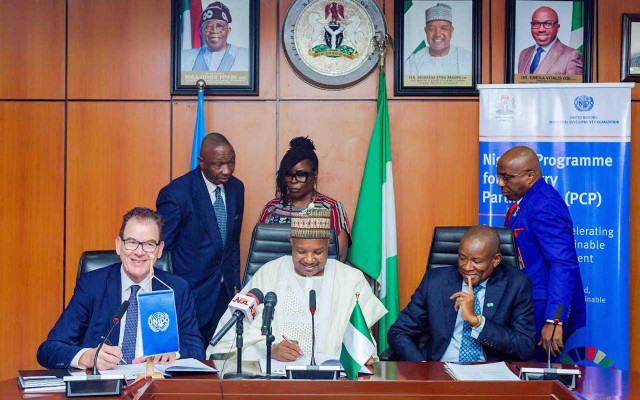The Federal Government and the United Nations Industrial Development Organisation (UNIDO) have entered into a Programme for Country Partnership (PCP) agreement worth $174,585,000 aimed at enhancing Nigeria's industrial development.
The Minister of Budget and Economic Planning, Abubakar Atiku Bagudu, who represented the Federal Government in signing the agreement, emphasized that this four-year partnership, covering the period from 2024 to 2028, signifies a significant step in the efforts of both the government and UNIDO to boost industrial development, create jobs, and stimulate economic change.
“This initiative is designed to strengthen Nigeria's industrial capacity, promote technological innovation, and encourage environmentally sustainable industrial methods,” he stated.
The programme is anticipated to create economic opportunities that will benefit Nigerians, especially the youth and marginalized communities. Bagudu pointed out that the funding strategy of the PCP consists of 85.7 percent or $149,619,345 from donors and partners mobilized by UNIDO, while the Nigerian government contributes 14.3 percent or $24,965,655. “To date, Nigeria has committed $1,276,658 as a payment to UNIDO,” he further added.
According to a statement from the Director of Information and Public Relations, Mrs. Osagie Jacobs, the minister urged stakeholders, development partners, the private sector, and civil society to collaborate to ensure the smooth implementation of the programme.
He praised UNIDO for its consistent partnership and unwavering support for Nigeria's industrial initiatives.
The Minister of State for Industry, John Owan Umoh, expressed optimism that UNIDO would act as a technical and strategic collaborator in advancing the Industrial Revolution Work Group (IRWG).
He also urged stakeholders to, “let us transition together from potential to productivity, from agreement to action, and from policy to prosperity as we implement the PCP.”
UNIDO Director-General, Gerd Muller, highlighted that the organization is mandated to ensure the industrial development of member nations through the PCP, focusing on Goal 9 as a primary objective, noting that Nigeria possesses the potential to become Africa's economic hub.
The PCP prioritizes several key areas critical to the government's industrial development strategy, including job creation, raw material availability, export opportunities, and investment attraction capabilities.
The Permanent Secretary of the Ministry of Budget and Economic Planning, Dr. Emeka Vitalis Obi, noted that ongoing interactions among the ministry, the Federal Ministry of Industry, Trade and Investments (FMITI), and UNIDO have reinforced the government's commitment to establishing a solid foundation for the initiation of PCP in Nigeria.
The President of the Manufacturers Association of Nigeria (MAN), Otunba Francis Meshionye, representing the private sector, expressed enthusiasm that manufacturers stand to gain funding from the programme and pledged the association's support in achieving the initiative's core objectives.
He called for more impactful projects to enhance the manufacturing sector within the country.




















